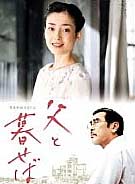The Face of Jizo

The film Face of Jizo premiered in the US on April 21st, 2005, at the recently held Global Hibakusha Film Festival at Boston’s Massachusetts Institute of Technology. On the second day of the festival, five Hibakusha (atom-bomb survivors), delivered appeals to the global community for the elimination of all nuclear weapons. Their pleas for a world without nuclear terror comes just months before the August 8th, 60th anniversary of the atomic bombing of Japan.
Chichi To Kuraseba (The Face of Jizo), is a Japanese play, and now a film, depicting the anguish and struggles of Mitsue, a Japanese woman who barely survived the Aug. 6th, 1945, atomic bombing of Hiroshima. In the story Mitsue tries to forget what happened on that fateful day when she lost her father Takezo in a sea of atomic fire, but she is tormented by the childhood memory of having run away instead of attempting to help her father. She cannot live with her guilt and torment, and convinces herself that she has no right to happiness. Originally a stage play by Hisashi Inoue that premiered in Japan in 1994, the work has since gone on to travel the world. The title Chichi To Kuraseba literally means Living with Father. The story takes place in the mid-1950s, with Mitsue living in her family’s bombed out but partially repaired house. Most of her friends and family were killed by pika-don (“flash blast”, the name Japanese gave to the atomic explosion), and she has only one friend, confidant, and adviser left in the world that she can talk honestly with… her father. Yes, Mitsue lives with her ghostly parent, making this one of the most unusual ghost films ever made.
But Face of Jizo is not a ghost film in the traditional sense, the only frightening moments come when one considers the realities of nuclear war. Instead, Mitsue’s spirit father materializes in order to encourage his lonely and angst-ridden daughter, advising her to embrace life and give in to love and happiness. The play was made into a movie directed by Kazuo Kuroki, and it opened in Japan during the summer of 2004. Kuroki’s film adaptation was re-titled Face of Jizo. In Japanese Buddhism, Jizo (jee-zo) is the guardian deity and savior of children, as well as the protector of travelers. You can see roadside statues of Jizo throughout Japan. In the story Mitsue finds that the family’s garden statue of Jizo had half of its face melted off from the atomic blast, and she relates the visage to her father’s inexplicable reappearance. The play’s transcript was translated into English by Roger Pulvers (and now available in book form), a professor at Tokyo Institute of Technology. His translation of the play was used for the English subtitles of Kuroki’s movie adaptation.
In the movie veteran actor Yoshio Harada plays the father, with the daughter played by award-winning actress Rie Miyazawa. Director Kuroki was not able to attend the Boston film festival, but he did offer the following remarks about his movie from Tokyo. “I hope the audience in the United States will watch it with the same feelings as the Japanese and realize the horrors of the atomic bomb, which to this day has people suffering from after effects.” Let no one think Kuroki’s film to be a work of anti-US propaganda that portrays the Japanese as innocent victims. As a boy the director grew up in Japanese occupied Manchuria, and he saw the ravages of Japan’s imperialist depredations. He’s quoted as having said the war was not over, “In fact, it has never been brought to a conclusion in this country (Japan) because responsibility for its heinous actions has never been taken, neither by the emperor, the government nor by the people. Japan today is like a wolf in lamb's clothing. The country is preparing itself, in the name of self-defense, for warlike action. Oh, I vividly remember the day we found out Pearl Harbor was bombed. Of course I was a kid, in occupied China, but you should have seen it. Everybody jumped for joy. And the same thing was happening all over Japan. Japanese people became convinced, on that day, that they were fighting to liberate Asia from the white man.” Kuroki went on to say that “Japan is a country where the mass media is cowardly. Even today they all basically follow the official line. If we don't do something about that, who will?”
Clearly the director is not pulling any punches, and his political views converge with the anti-war politics of the play’s author, Inoue, who has said, “At the time, the Japanese were the victimizers in what they did in Asia. They were the perpetrators of wrong throughout Asia. However, I remain adamant that those two atomic bombs were dropped not only on the Japanese but on all humankind. The people exposed to those bombs represent all people around the world in the second half of the 20th century.” These comments should be seen in the context of Japan’s renewed militarism, from its soldiers presently doing duty in occupied Iraq, to the changing of Japan’s pacifist constitution allowing the deployment of troops on foreign shores. One must also take into consideration the Bush administration’s stance towards Korea and Iran, against whom military action has been threatened. Both Inoue and Kuroki hold Japan responsible for heinous crimes committed in the war time years - but added to their heartfelt admonition is the message is that the world community must find a non-violent way of solving its problems… or in the very near future there will be more people like Mitsue and her ghostly father. (posted by M.)


<< Home